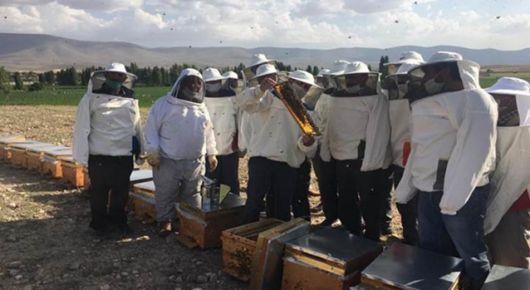Sweet future for Turkish beekeepers

Beekeeping is a prominent activity not only as an important source of income but also for the bees’ key role to preserve biodiversity and the natural balance of ecosystems. To this end, FAO provided 400 beehives and equipment to beekeepers in the villages of Karaman and Konya districts where beekeeping is an especially important activity, to support the integrated forest management plan for Ereğli in the centre of Turkey.
The activity is part of a project on sustainable land management and climate-friendly agriculture jointly implemented with the Ministry of Agriculture and Forestry and funded by the Global Environment Fund.
Honeybees carry out 85 percent of pollination in nature. Hence as bees fly from flower to flower, they deliver a crucial service of preserving and developing biodiversity and ensuring food reliability and income, as well as honey and other bee products.
“Beekeeping supports farmers’ livelihoods through additional income generation and it also contributes to enhanced pollination of plants and trees,” said Peter Pechacek, FAO forestry officer and leading expert of the project. “Pollination is one of the greatest natural processes that bees and other pollinators provide to mankind.”
Beekeeping has not only a positive impact on rural development, it also has ecological benefits and plays a major role in preventing climate change. Pollination and increased presence of plants foster the protection of biodiversity, through which beekeeping significantly contributes to the control of soil erosion and water regime, making it indispensable for climate-friendly agricultural practices.
Saygun Ezer, a bee producer from Berendi village loves beekeeping. With the ten new hives, he has more than doubled the number of his beehives, for which Ezer is very grateful to FAO and the Ministry of Agriculture and Forestry.
As the head of Öbektaş village, Özlem Çelik noted, her village was very suitable for beekeeping due to its plant diversity, making this a very important opportunity for them. Head of Kıraman village, Durmuş Güney, expressed appreciation on behalf of his community, saying that this support would be very useful for the villagers.
In Turkey, bee pollen and propolis production has increased in the last five years. However, producers and consumers are not conscious enough of other bee products (bee milk, bee pie, beeswax, bee venom), and production quantities are very small. The potential of bees in increasing agricultural yields through pollination is underutilized as well. Thus, during the distribution of the hives, the President of the Gaziantep Beekeepers Association, Nebi Koca, held a training session on the importance of beekeeping, including detailed information on the conditions necessary for technical beekeeping, bee diseases, bee products, and the benefits to human life.
7 July 2020, Ankara, Turkey
